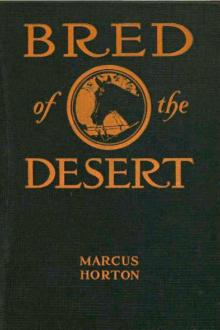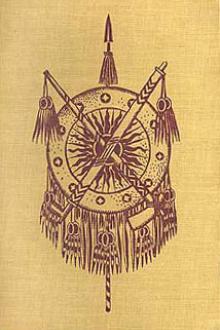A Deal in Wheat and Other Stories of the New and Old West, Frank Norris [best interesting books to read TXT] 📗

- Author: Frank Norris
Book online «A Deal in Wheat and Other Stories of the New and Old West, Frank Norris [best interesting books to read TXT] 📗». Author Frank Norris
It was a strange affair—a strange scene. The coast, flat, gray, dreary beyond all power of expression, lonesome as the interstellar space, and quite as cold, and in all that limitless vastness of the World's Edge, two specks—the hut, its three windows streaming with light, and the tiny schooner rocking in the offing. Over all flared the pallid incandescence of the auroras.
The Company drank steadily, and Strokher, listening from the schooner's quarterdeck, heard the shouting and the songs faintly above the wash and lapping under the counter. Two hours had passed since the moment he guessed that the feast had been laid. A third went by. He grew uneasy. There was no cessation of the noise of carousing. He even fancied he heard pistol shots. Then after a long time the noise by degrees wore down; a long silence followed. The hut seemed deserted; nothing stirred; another hour went by.
Then at length Strokher saw a figure emerge from the door of the hut and come down to the shore. It was Hardenberg. Strokher saw him wave his arm slowly, now to the left, now to the right, and he took down the wig-wag as follows: "Stand—in—closer—we—have—the—skins."
IIIDuring the course of the next few days Strokher heard the different versions of the affair in the hut over and over again till he knew its smallest details. He learned how the "Boomskys" fell upon Ryder's champagne like wolves upon a wounded buck, how they drank it from "enameled-ware" coffee-cups, from tin dippers, from the bottles themselves; how at last they even dispensed with the tedium of removing the corks and knocked off the heads against the table-ledge and drank from the splintered bottoms; how they quarreled over the lees and dregs, how ever and always fresh supplies were forthcoming, and how at last Hardenberg, Ally Bazan and Slick Dick stood up from the table in the midst of the seven inert bodies; how they ransacked the place for the priceless furs; how they failed to locate them; how the conviction grew that this was the wrong place after all, and how at length Hardenberg discovered the trap-door that admitted to the cellar, where in the dim light of the uplifted lanterns they saw, corded in tiny bales and packages, the costliest furs known to commerce.
Ally Bazan had sobbed in his excitement over that vision and did not regain the power of articulate speech till the "loot" was safely stowed in the 'tween-decks and Hardenberg had given order to come about.
"Now," he had observed dryly, "now, lads, it's Hongkong—or bust."
The tackle had fouled aloft and the jib hung slatting over the sprit like a collapsed balloon.
"Cast off up there, Nick!" called Hardenberg from the wheel.
Nickerson swung himself into the rigging, crying out in a mincing voice as, holding to a rope's end, he swung around to face the receding hut: "By-bye-skevitch. We've had such a charming evening. Do hope-sky we'll be able to come again-off." And as he spoke the lurch of the Bertha twitched his grip from the rope. He fell some thirty feet to the deck, and his head carromed against an iron cleat with a resounding crack.
"Here's luck," observed Hardenberg, twelve hours later, when Slick Dick, sitting on the edge of his bunk, looked stolidly and with fishy eyes from face to face. "We wa'n't quite short-handed enough, it seems."
"Dotty for fair. Dotty for fair," exclaimed Ally Bazan; "clean off 'is nut. I s'y, Dick-ol'-chap, wyke-up, naow. Buck up. Buck up. 'Ave a drink."
But Nickerson could only nod his head and murmur: "A few more—consequently—and a good light——" Then his voice died down to unintelligible murmurs.
"We'll have to call at Juneau," decided Hardenberg two days later. "I don't figure on navigating this 'ere bath-tub to no Hongkong whatsoever, with three hands. We gotta pick up a couple o' A.B.'s in Juneau, if so be we can."
"How about the loot?" objected Strokher. "If one of those hands gets between decks he might smell—a sea-otter, now. I put it to you he might."
"My son," said Hardenberg, "I've handled A.B.'s before;" and that settled the question.
During the first part of the run down, Nickerson gloomed silently over the schooner, looking curiously about him, now at his comrades' faces, now at the tumbling gray-green seas, now—and this by the hour—at his own hands. He seemed perplexed, dazed, trying very hard to get his bearings. But by and by he appeared, little by little, to come to himself. One day he pointed to the rigging with an unsteady forefinger, then, laying the same finger doubtfully upon his lips, said to Strokher: "A ship?"
"Quite so, quite so, me boy."
"Yes," muttered Nickerson absently, "a ship—of course."
Hardenberg expected to make Juneau on a Thursday. Wednesday afternoon
Slick Dick came to him. He seemed never more master of himself. "How did
I come aboard?" he asked.
Hardenberg explained.
"What have we been doing?"
"Why, don't you remember?" continued Hardenberg. He outlined the voyage in detail. "Then you remember," he went on, "we got up there to Point Barrow and found where the Russian fellows had their post, where they caught sea-otters, and we went ashore and got 'em all full and lifted all the skins they had——"
"'Lifted'? You mean stole them."
"Come here," said the other. Encouraged by Nickerson's apparent convalescence, Hardenberg decided that the concrete evidence of things done would prove effective. He led him down into the 'tween-decks. "See now," he said. "See this packing-case"—he pried up a board—"see these 'ere skins. Take one in y'r hand. Remember how we found 'em all in the cellar and hyked 'em out while the beggars slept?"
"Stole them? You say we got—that is you did—got somebody intoxicated and stole their property, and now you are on your way to dispose of it."
"Oh, well, if you want to put it thataway. Sure we did."
"I understand——Well——Let's go back on deck. I want to think this out."
The Bertha Millner crept into the harbour of Juneau in a fog, with ships' bells tolling on every side, let go her anchor at last in desperation and lay up to wait for the lifting. When this came the Three Crows looked at one another wide-eyed. They made out the drenched town and the dripping hills behind it. The quays, the custom house, the one hotel, and the few ships in the harbour. There were a couple of whalers from 'Frisco, a white, showily painted passenger boat from the same port, a Norwegian bark, and a freighter from Seattle grimy with coal-dust. These, however, the Bertha's company ignored. Another boat claimed all their attention. In the fog they had let go not a pistol-shot from her anchorage. She lay practically beside them. She was the United States revenue cutter Bear.
"But so long as they can't smell sea-otter skin," remarked Hardenberg,
"I don't know that we're any the worse."
"All the syme," observed Ally Bazan, "I don't want to lose no bloomin' tyme a-pecking up aour bloomin' A.B.'s."
"I'll stay aboard and tend the baby," said Hardenberg with a wink. "You two move along ashore and get what you can—Scoovies for choice. Take Slick Dick with you. I reckon a change o' air might buck him up."
When the three had gone, Hardenberg, after writing up the painfully doctored log, set to work to finish a task on which the adventurers had been engaged in their leisure moments since leaving Point Barrow. This was the counting and sorting of the skins. The packing-case had been broken open, and the scanty but precious contents littered an improvised table in the hold. Pen in hand, Hardenberg counted and ciphered and counted again. He could not forbear a chuckle when the net result was reached. The lot of the skins—the pelt of the sea-otter is ridiculously small in proportion to its value—was no heavy load for the average man. But Hardenberg knew that once the "loot" was safely landed at the Hongkong pierhead the Three Crows would share between them close upon ten thousand dollars. Even—if they had luck, and could dispose of the skins singly or in small lots—that figure might be doubled.
"And I call it a neat turn," observed Hardenberg. He was aroused by the noise of hurried feet upon the deck, and there was that in their sound that brought him upright in a second, hand on hip. Then, after a second, he jumped out on deck to meet Ally Bazan and Strokher, who had just scrambled over the rail.
"Bust. B-u-s-t!" remarked the Englishman.
"'Ere's 'ell to pay," cried Ally Bazan in a hoarse whisper, glancing over at the revenue cutter.
"Where's Nickerson?" demanded Hardenberg.
"That's it," answered the colonial. "That's where it's 'ell. Listen naow. He goes ashore along o' us, quiet and peaceable like, never battin' a eye, we givin' him a bit o' jolly, y' know, to keep him chirked up as ye might s'y. But so soon as ever he sets foot on shore, abaout faice he gaoes, plumb into the Custom's orfice. I s'ys, 'Wot all naow, messmite? Come along aout o' that.' But he turns on me like a bloomin' babby an s'ys he: 'Hands orf, wretch!' Ay, them's just his words. Just like that, 'Hands orf, wretch!' And then he nips into the orfice an' marches fair up to the desk an' sy's like this—we heerd him, havin' followed on to the door—he s'ys, just like this:
"'Orfficer, I am a min'ster o' the gospel, o' the Methodis' denomineye-tion, an' I'm deteyined agin my will along o' a pirate ship which has robbed certain parties o' val-able goods. Which syme I'm pre-pared to attest afore a no'try publick, an' lodge informeye-tion o' crime. An',' s'ys he, 'I demand the protection o' the authorities an' arsk to be directed to the American consul.'
"S'y, we never wyted to hear no more, but hyked awye hot foot. S'y, wot all now. Oh, mee Gord! eyen't it a rum gao for fair? S'y, let's get aout o' here, Hardy, dear."
"Look there," said Hardenberg, jerking his head toward the cutter, "how far'd we get before the customs would 'a' passed the tip to her and she'd started to overhaul us? That's what they feed her for—to round up the likes o' us."
"We got to do something rather soon," put in Strokher. "Here comes the custom house dinghy now."
As a matter of fact, a boat was putting off from the dock. At her stern fluttered the custom house flag.
"Bitched—bitched for fair!" cried Ally Bazan.
[Illustration: "'ERE'S 'ELL TO PAY!"
From a drawing by Lucius Hitchcock Courtesy of Collier's Weekly.]
"Quick, now!" exclaimed Hardenberg. "On the jump! Overboard with that loot!—or no. Steady! That won't do. There's that dam' cutter. They'd see it go. Here!—into the galley. There's a fire in the stove. Get a move on!"
"Wot!" wailed Ally Bazan. "Burn the little joker. Gord, I can't,
Hardy, I can't. It's agin human nature."
"You can do time in San Quentin, then, for felony," retorted Strokher as he and Hardenberg dashed by him, their arms full of the skins. "You can do time in San Quentin else. Make your choice. I put it to you as between man and man."
With set teeth, and ever and again glancing over the rail at the oncoming boat, the two fed their fortune to the fire. The pelts, partially cured and still fatty, blazed like crude oil, the hair crisping, the hides melting into rivulets of grease. For a minute the schooner reeked of the smell and a stifling smoke poured from the galley stack. Then the embers of the fire guttered and a long whiff of sea wind blew away the reek. A single skin, fallen in the scramble, still remained on the floor of the galley. Hardenberg snatched it up, tossed it into the flames and clapped the door to. "Now, let him squeal," he declared. "You fellows, when that boat gets here, let me talk; keep your mouths shut or, by God, we'll all wear stripes."
The Three Crows watched the boat's approach in a silence broken only once by a long whimper from Ally Bazan. "An' it was a-workin' out as lovely as Billy-oh," he said, "till that syme underbred costermonger's swipe remembered he was Methody—an' him who, only a few d'ys back, went raound s'yin' 'scrag the "Boomskys"!' A couple o' thousand pounds gone as quick as look at it. Oh, I eyn't never goin' to git over this."
The boat came up and the Three Crows were puzzled to note that no brass-buttoned personage sat in the stern-sheets, no harbour police glowered at them from the bow, no officer of





Comments (0)